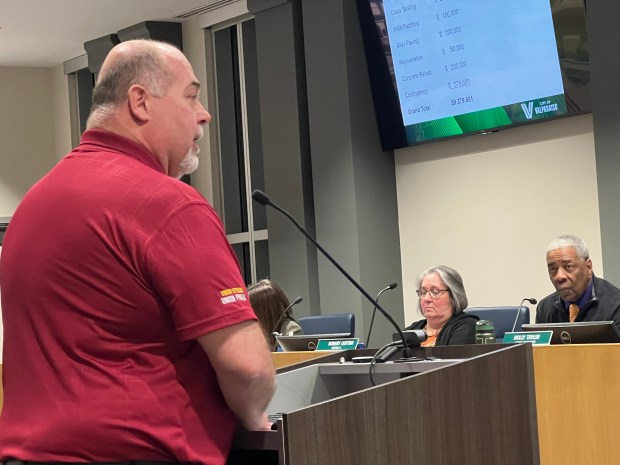Valparaiso Mayor Jon Costas announced Tuesday he would sign and approve the city council’s recently passed Ordinance No. 6 outlining responsible bidding practices, despite his public concerns and talk that he might veto the ordinance, which was not favored by Republican council members.
“After receiving much counsel and deliberating extensively over the potential pros and cons of its enactment, I have decided to sign Ordinance 6-2025 into law,” Costas said in a statement Wednesday.
“While I, along with three other city council members, have reasonable concerns over how it may impact private investment and small business in our city, I do not believe a mayoral veto is warranted under the circumstances. I trust that the city council will implement the ordinance in a manner that addresses these concerns, while promoting the use of local labor in private construction projects that receive city incentives.”
A responsible bidding ordinance was passed at the Monday, March 24 meeting by a vote of 4-2. The ordinance, said Council President Ellen Kapitan, D-At-large, sets standards and requirements for contractors submitting bids to perform construction work on public works projects, and is an extension of the city’s current ordinance. The new ordinance establishes responsible business practices for recipients of city economic incentives on projects valued at $350,000 or more, she said. The ordinance requires contractors to meet specific conditions, including safety standards, proper worker classification, and a preference for local skilled workers.
Voting for the ordinance with Kapitan were Emilie Hunt, D-At-large; Barbara Domer, D-3rd; and Robert Cotton, D-2nd. Peter Anderson, R-5th, and Diana Reed, D-1st, opposed the measure. Jack Pupillo, R-4th, did not attend the March 24 meeting.
Councilman Anderson published a social media post late Wednesday afternoon explaining his dissatisfaction with Ordinance 6, and he listed the names of council members who voted in favor of the ordinance and each of their email contacts.
“To say I’m disappointed is the understatement of the decade,” Anderson said.
“This is the day that Valpo has said: ‘We are closed for business.’ These Councilmembers have voted in favor of Ordinance 6, and in my opinion, against the local worker. It is very likely that significant investment will pass the city right by, stifling all local workers. Valpo is indeed, close for business.”
Lake County adopted a similar ordinance in 2022 and Chesterton approved a very similar ordinance in December 2024. Citing both, Costas said the effect of such an ordinance on the private sector is untested.
Councilman Cotton, who had originally introduced and crafted an earlier version of the ordinance and introduced it in February, was pleased with the mayor’s decision.
“While Ordinance 6 may very well benefit local skilled workers, it is important to note that passing this ordinance is not about unions as much as it is about establishing equitable standards when taxpayers subsidize private projects,” Cotton said.
“It was stated so well by Mr. Dewey Pearman, of the Construction Advancement Foundation, something to the effect of, ‘This ordinance provides clear standards for what Valparaiso taxpayers should rightly expect from contractors who receive public assistance in pursuit of their own private interests.’ Ordinance 6 will only apply to a small number of private sector contractors when they ask for and receive at least $350,000 in taxpayer-funded development incentives.”
Harvey Jackson spoke during the public hearing about Ordinance 6, explaining he “represents 3,200 Teamsters based in Northwest Indiana” and had countered Cotton publicly, saying, “There were people left out of this conversation since I believe only two unions were actually talked to about this ordinance.”
“I don’t think this ordinance and conversation should exclude anyone at the table,” Jackson said.
“It should be about safety first and making sure people can do a job right. I don’t think it should be about union versus non-union.”
Costas said all contractors and workers are part of the city’s “level of investment and projects to continue to keep the city vibrant and strong.”
“We are a city that invites private investment, champions small business, and is committed to fiscal responsibility,” Costas said.
“I will work closely with the council to apply Ordinance 6 to preserve those objectives as we continue to promote use of local construction labor alongside the perception that Valparaiso is ‘open for business.’ ”
Philip Potempa is a freelance reporter for the Post-Tribune.



